Best Waterproof Metal Detectors UK (2025) | Expert Reviews

Written by Piotr Lesniewski
Detectorist • Scotland
As an Amazon Associate we earn commission from qualifying purchases. Read our full Affiliate Disclosure.
As a detectorist based in the UK, I spend a huge amount of my time on the coast, searching the foreshore, or wading into shallow rivers and lochs.
For this kind of hunting, a waterproof metal detector isn't just a luxury; it's an essential piece of kit. It allows you to get to the places others can't, searching the wash lines where heavy gold rings settle or exploring riverbeds that have been collecting history for centuries.
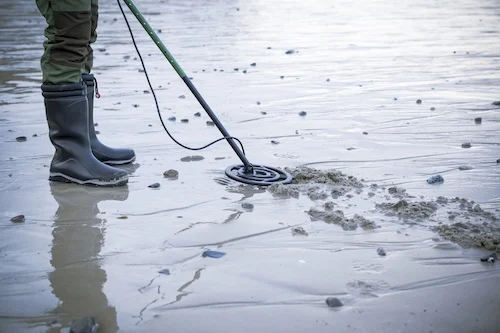
The main issue for newcomers and even seasoned hobbyists is cutting through the jargon. Understanding what specs like 'multi-frequency' or 'ground balance' actually mean for your hunt can be tricky.
I’ve spent countless hours swinging different waterproof metal detectors in all conditions, from calm estuaries to the choppy North Sea coast, to figure out what really works. This is my breakdown of the best waterproof machines on the market today, and my guide to finding the Best Waterproof Metal Detector for you.
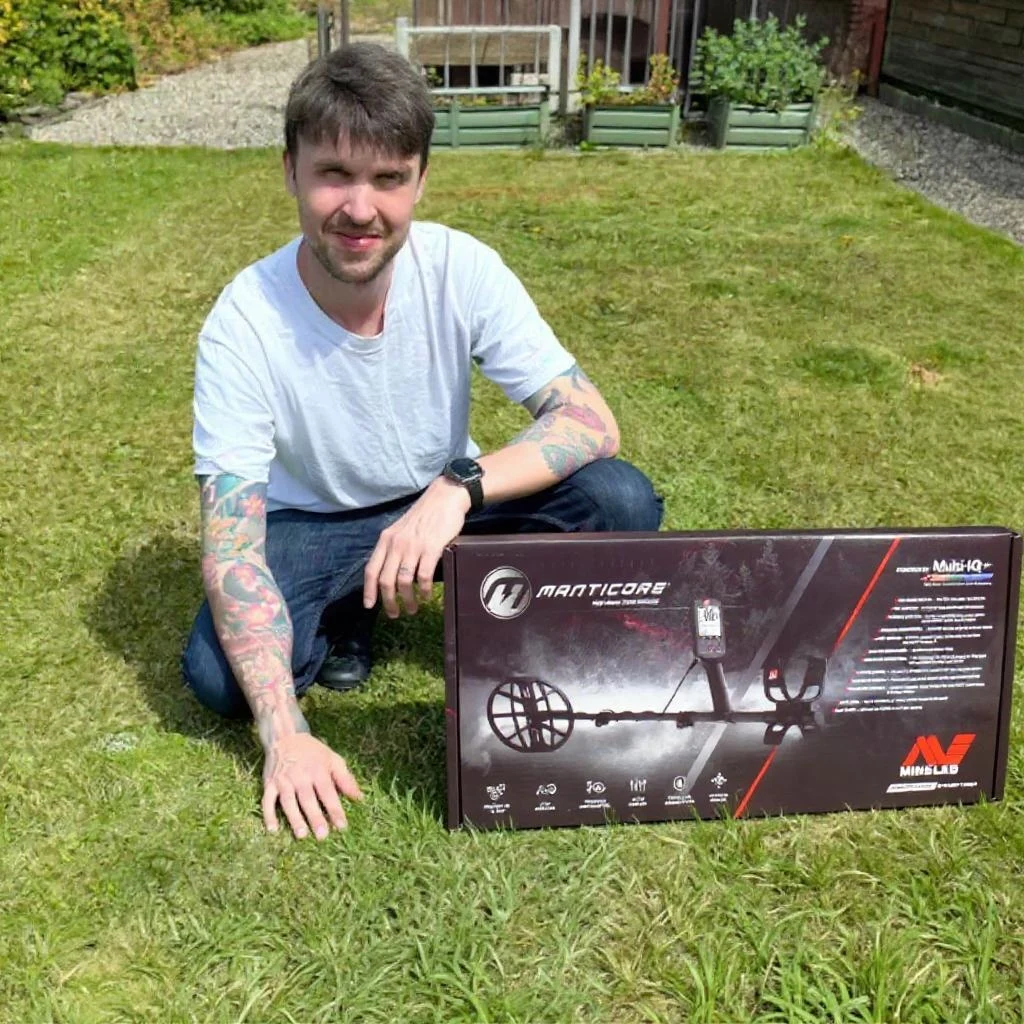
Best Waterproof Metal Detectors For The UK in 2025
Minelab Equinox 900
Best Value For Money Waterproof Metal Detector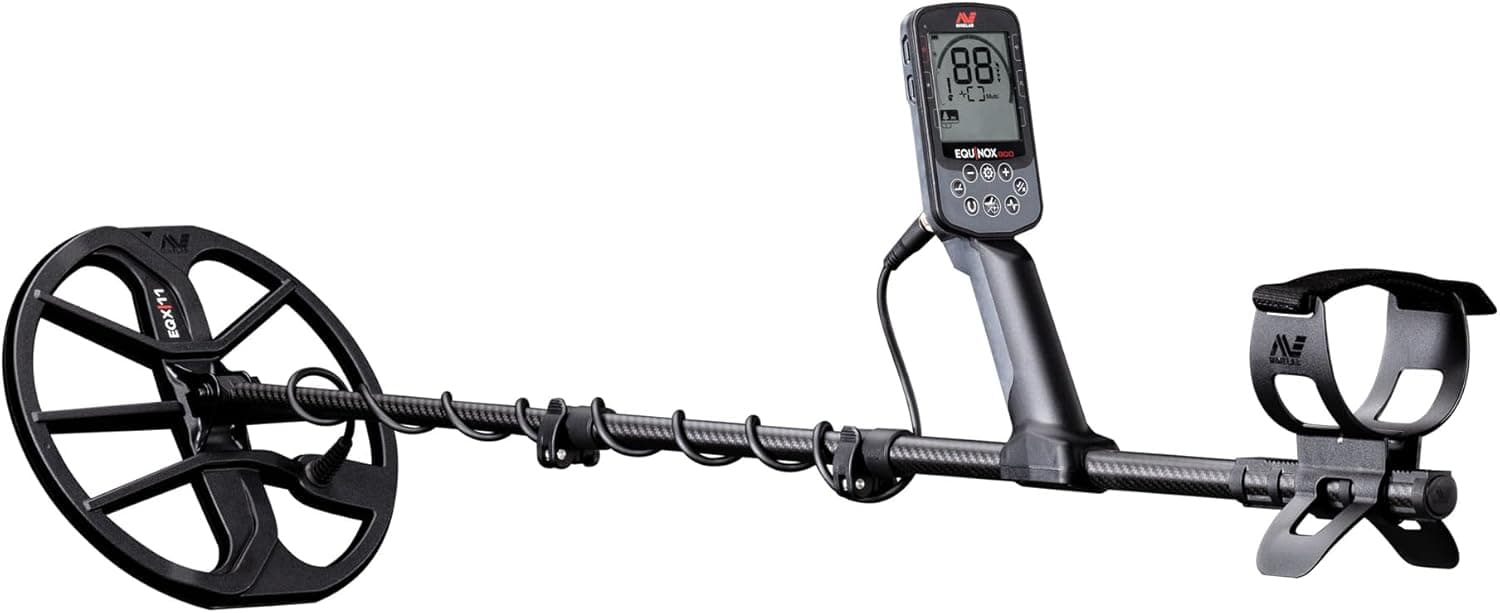
As an Amazon Associate we earn from qualifying purchases.
I Recommend This If...
- You are a serious hobbyist looking to upgrade, or you spend a lot of time on UK beaches.
- You need excellent performance in mineralised ground (like wet salt sand) where single-frequency detectors struggle.
- You value a lightweight, ergonomic design for long detecting sessions without fatigue.
- You want a metal detector with a high ceiling for growth, offering advanced settings you can learn over time.
Best Value For Money Waterproof Metal Detector | Minelab Equinox 900
The Minelab Equinox 900 is, in my opinion, the absolute sweet spot for any serious UK detectorist. It’s a true multi-frequency metal detector, meaning it transmits several frequencies into the ground at once.
This is a game-changer on our wet, salty beaches, as it handles the mineralisation with incredible stability. It's fully submersible up to 5 meters (16ft), which is more than enough for anything short of full-on diving.
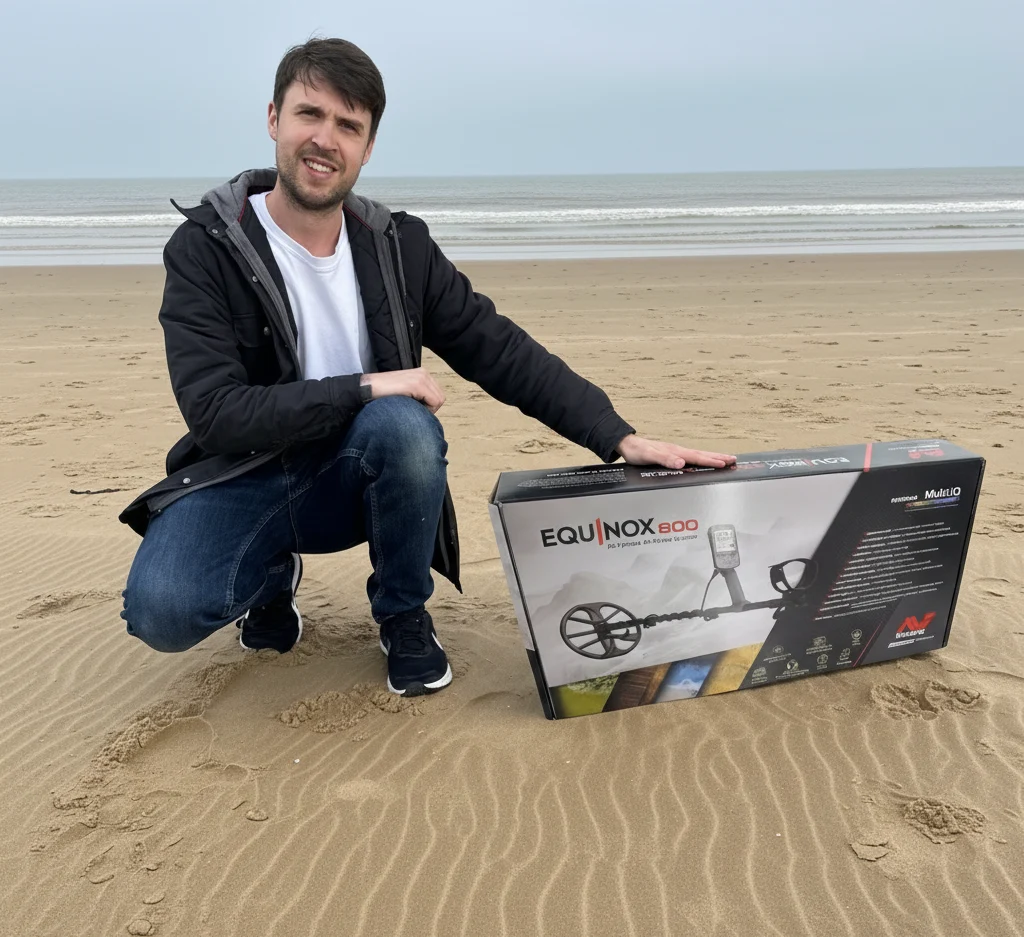
It’s also incredibly light, thanks to its new carbon-fibre construction, weighing in at just 1.27kg. The target separation is another standout feature, allowing it to pick out good targets amongst iron junk, which is vital on historical sites.
Swinging the Equinox 900 during a long session on a busy beach feels effortless.
I remember one particular evening hunt as the tide was going out; the 900 was completely silent over the wet sand where single-frequency metal detectors would be chattering away. I was able to clearly pick out the crisp, high tone of a small Victorian silver threepence nestled right next to a rusty iron nail – a target my old metal detector would have likely missed.
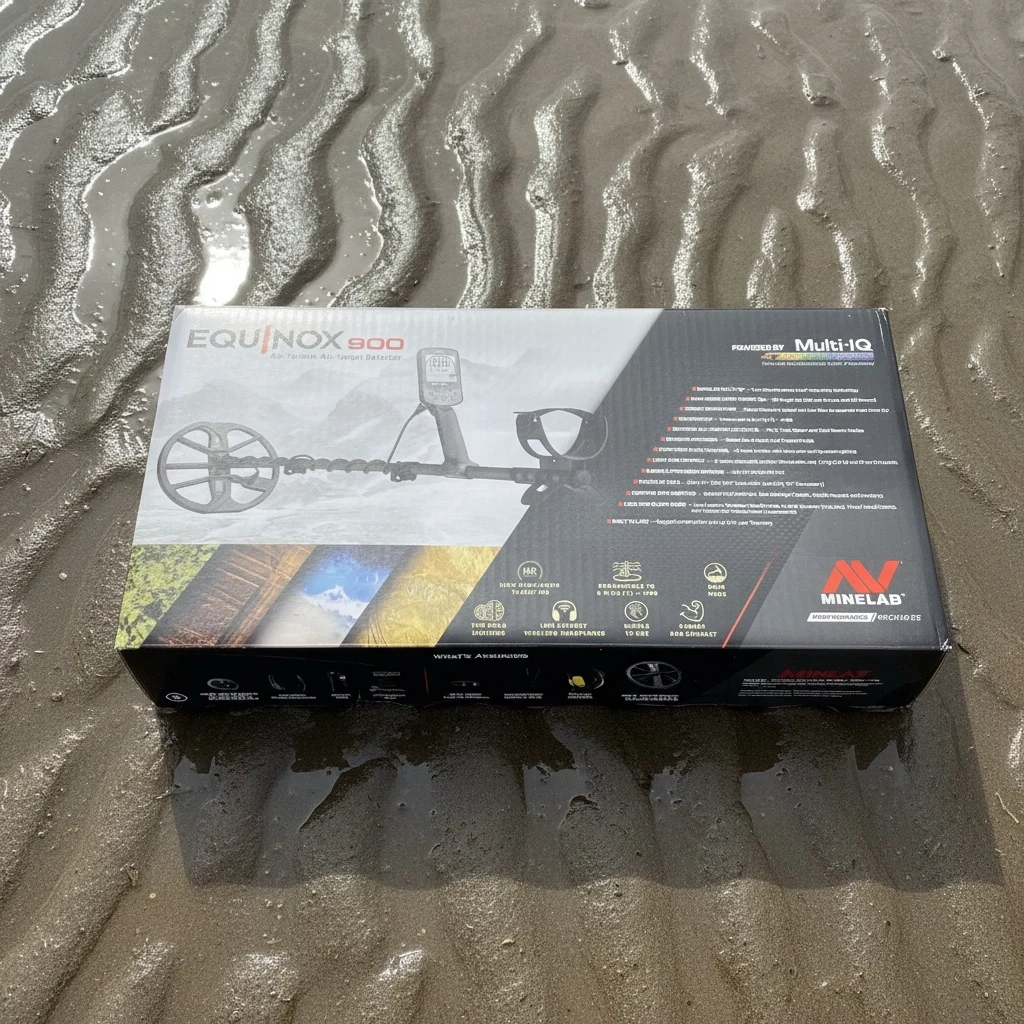
The speed and accuracy of the target ID mean I dig less junk and can cover more ground effectively. For the price, you are getting performance that was, until recently, only available in top-tier, far more expensive metal detectors.
Nokta Simplex+
Best Budget Waterproof Metal Detector
As an Amazon Associate we earn from qualifying purchases.
I Recommend This If...
- You are a beginner to the hobby, on a strict budget, or looking for a fantastic backup metal detector.
- You want to try river or shallow water detecting without a huge financial commitment.
- You appreciate simplicity and "turn-on-and-go" operation without getting bogged down in complex settings.
- You need a travel-friendly metal detector, as its collapsible shaft makes it very compact.
Best Budget Waterproof Metal Detector | Nokta Simplex+
For those just starting or wanting a capable backup metal detector without breaking the bank, the Nokta Simplex+ is an absolute marvel. It’s not just splash-proof; it's fully submersible to 3 meters (10ft), a feature that is almost unheard of at this price point.
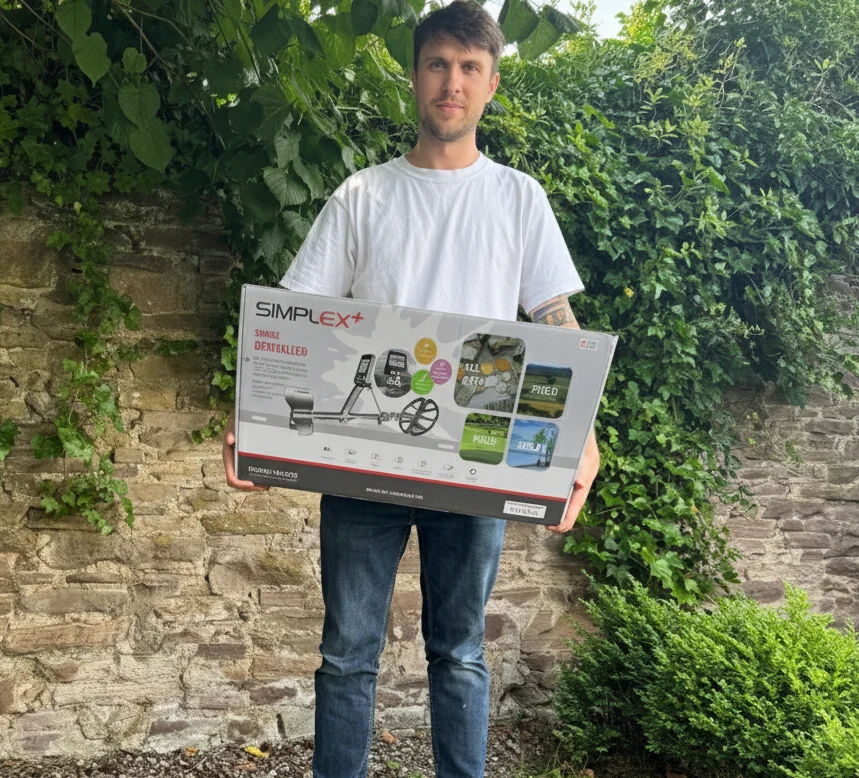
It’s a single-frequency (12kHz) VLF metal detector, but it performs brilliantly for a budget model. It has simple, intuitive controls, a clear backlit screen, and even a vibration mode in the handle, which is fantastic when you’re detecting in murky water and can't easily hear the audio tones.
It also comes with wireless headphone capability, another premium feature on a budget metal detector.
My first time taking the Simplex+ into a local river, I was genuinely shocked at its performance.
I switch it to the dedicated Beach Mode, and it handles the mineralised riverbed with ease. The vibration in the handle buzzes insistently as I sweep over a strong target, and after a few scoops with my sand scoop, I pull out a beautiful, intact Georgian-era bowl.

The simplicity is its strength. I can hand it to a friend who has never detected before, and within five minutes, they are up and running, finding coins in the shallows. It proves you don’t need to spend a fortune to get in the water and find history.
Garrett AT Pro
Best Mid-Range Waterproof Metal Detector
As an Amazon Associate we earn from qualifying purchases.
I Recommend This If...
- You are an intermediate detectorist who wants a rugged, all-terrain metal detector for both land and water.
- You are a "tone" hunter who relies on nuanced audio to identify targets before you dig.
- You need a famously durable and rugged metal detector that can withstand rough handling on challenging sites.
- You hunt on inland historical sites (like Roman or Saxon areas) and need good iron discrimination.
Best Mid-Range Waterproof Metal Detector | Garrett AT Pro
The Garrett AT Pro is a legendary metal detector for a reason. It’s been a workhorse for detectorists for years and remains a fantastic mid-range option.
It’s built like a tank and is fully waterproof to 3 meters (10ft). The AT Pro runs on a single frequency of 15kHz, which is a great middle ground that offers good sensitivity to smaller items like coins and jewellery without being too susceptible to ground interference.

Its most famous feature is the Proportional Audio ('Pro-Audio'), which gives you a much more nuanced and detailed audio response about a target's size, shape, and depth.
I've spent hundreds of hours with the AT Pro on Roman and Saxon permissions. In Pro Mode, I learn to listen to the subtle 'rolls' in the audio. A sharp, clear 'zip-zip' sound tells me I have a coin, while a broader, softer tone might be a button or buckle.
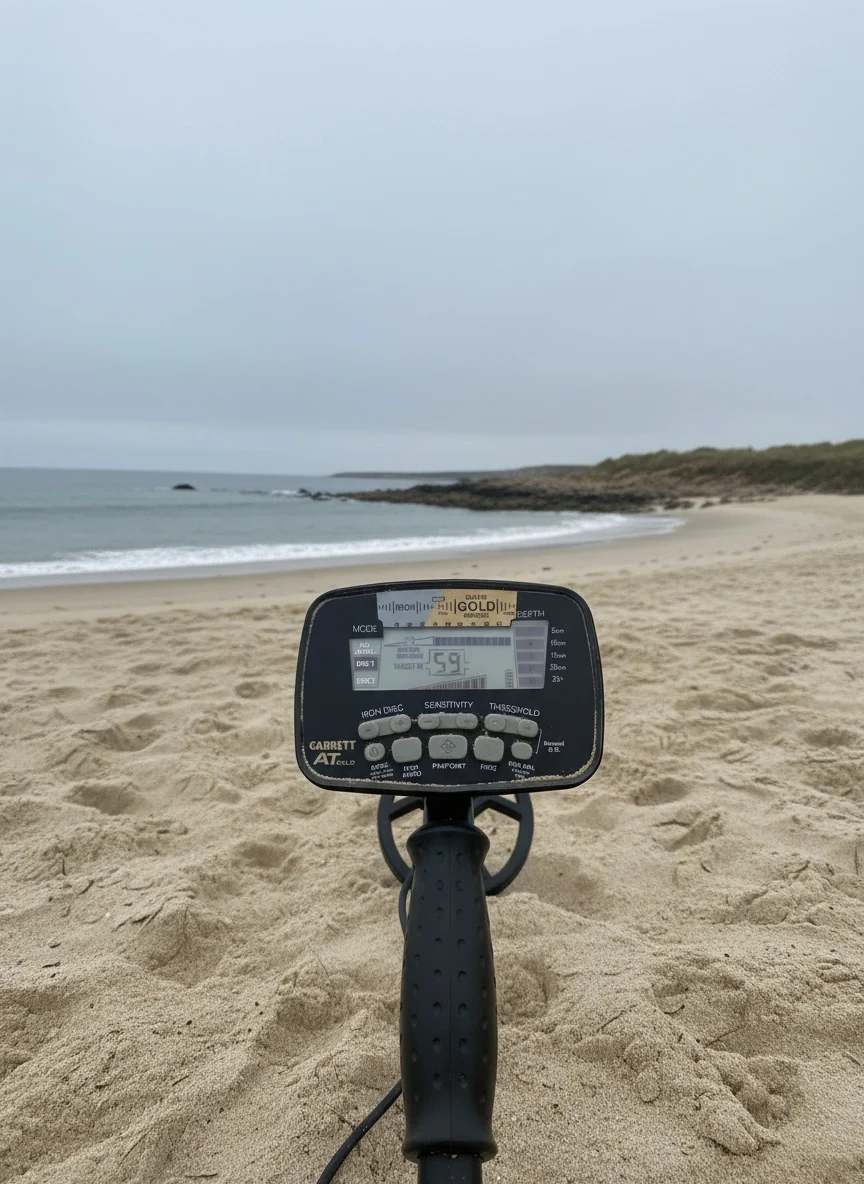
I remember wading along the edge of a medieval stream crossing, the AT Pro in my hand. I hear that faint but clear audio roll that suggests a good target at depth. After some careful digging in the silty bank, I unearth a stunning silver hammered coin of Edward I.
It’s this audio detail that gives you the confidence to dig those iffy signals that other metal detectors might report as iron. It's a true all-terrain metal detector that has earned its place in the hall of fame.
XP Deus II
Best High-End Waterproof Metal Detector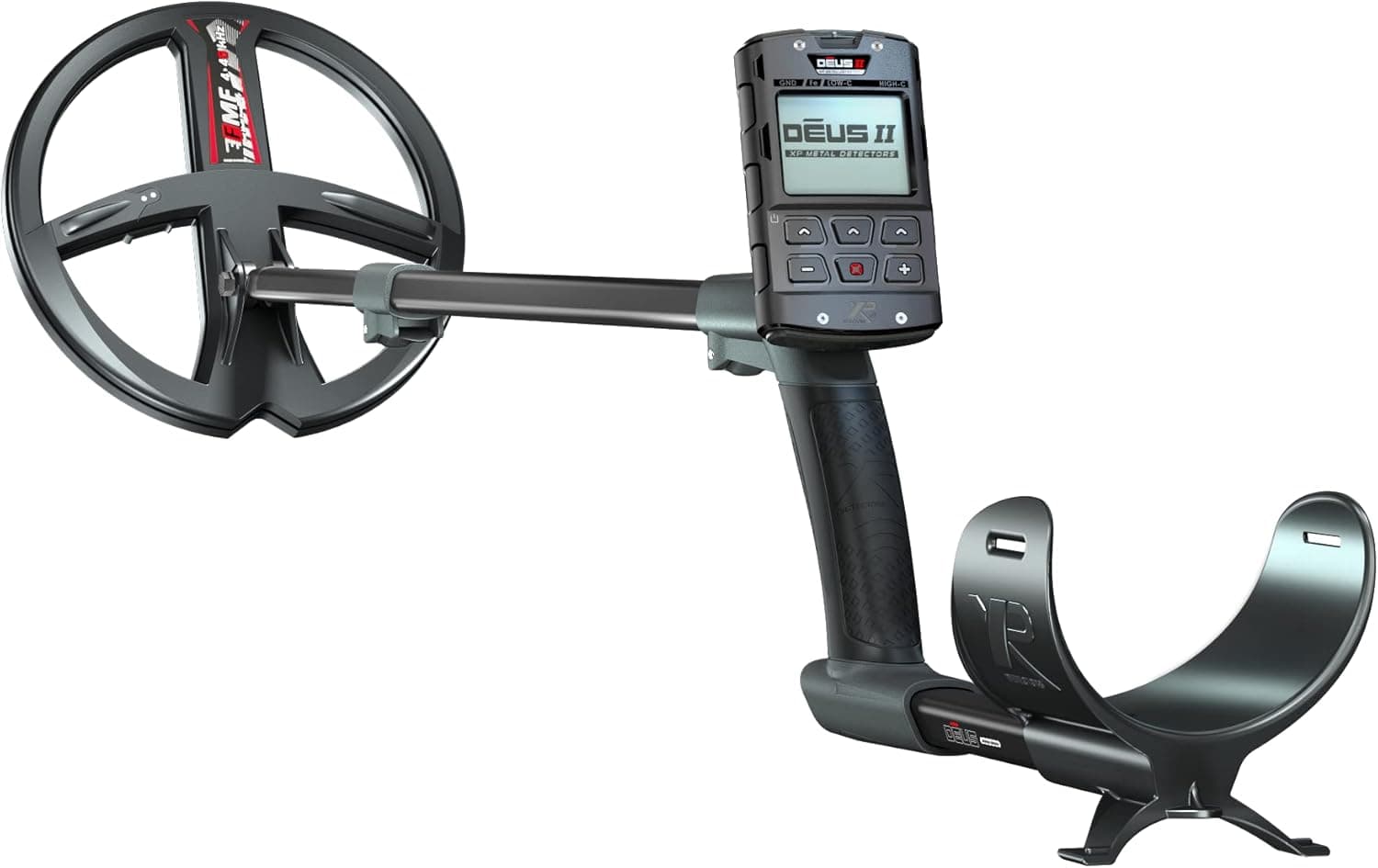
As an Amazon Associate we earn from qualifying purchases.
I Recommend This If...
- You are an experienced or professional detectorist who demands the absolute best performance.
- You need the fastest possible recovery speed to pick out good targets in extremely trashy or iron-infested areas.
- You want the ultimate flexibility of a completely wireless system and the lightest setup available.
- You plan on doing serious underwater detecting or diving, requiring a submersion depth greater than the standard 3-5 meters.
Best High-End Waterproof Metal Detector | XP Deus II
When money is no object and you simply want the best performance possible, the XP Deus II is the answer. It is a technological masterpiece.
It’s the world's first completely wireless multi-frequency metal detector, and it’s waterproof to an incredible 20 meters (66ft). The Fast Multi-Frequency (FMF) technology is astonishingly fast and powerful, giving it unparalleled depth and target separation in the most challenging conditions.
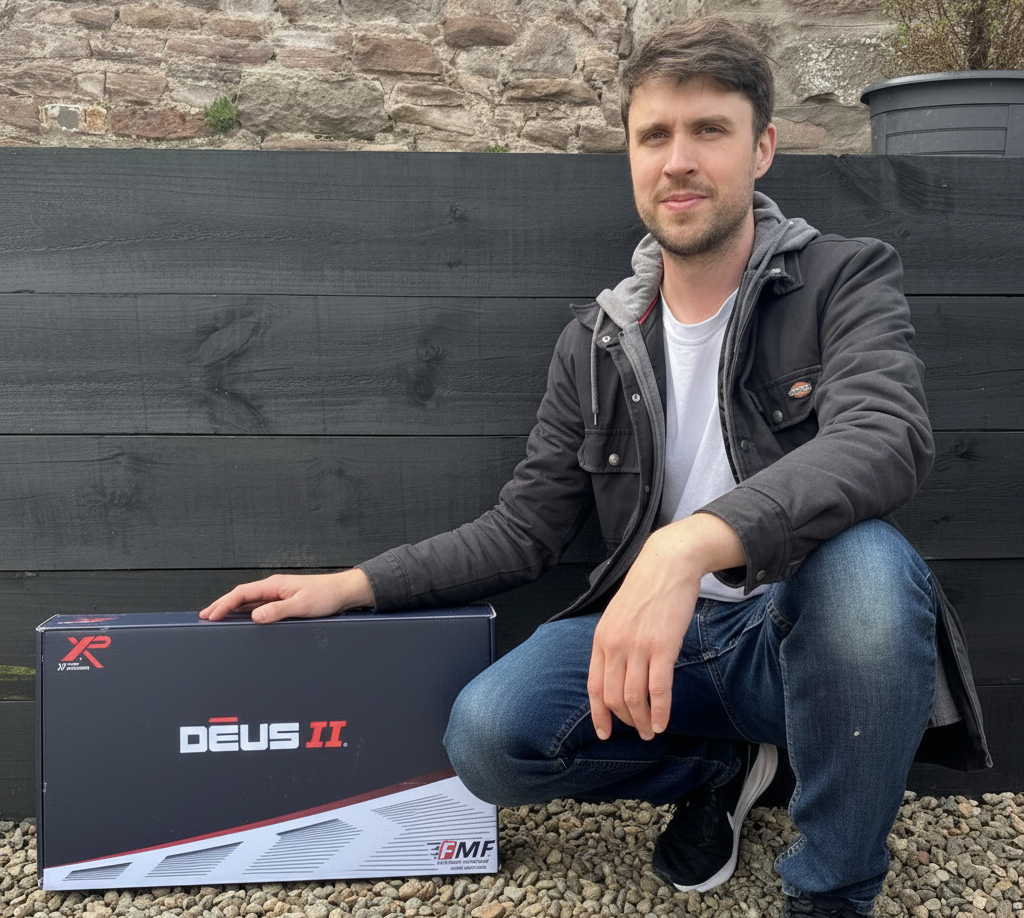
The whole setup is feather-light at under 1kg, and the ability to use the compact remote or just the wireless headphones as your controller offers incredible flexibility.
My first session with the Deus II was on a heavily detected stretch of beach that I thought had been cleared out.
I select the 'Diving' program, submerge the coil, and start sweeping. The speed is the first thing I notice; it processes targets instantly. In a patch of ground littered with iron, it pulls out a faint, high-pitched signal. The target ID is stable, suggesting silver. After digging down about 12 inches into the wet sand.

The Deus II isn't just a metal detector; it's a precision instrument that opens up old ground and makes it new again.
What to Look For When Picking a Waterproof Metal Detector
Submersion Depth
Check the official rating from the manufacturer. A metal detector labelled "water-resistant" or "weatherproof" can handle rain, but you can't put it underwater.
For wading and beach hunting, look for a metal detector that is fully submersible to at least 3 meters (10ft). This ensures a rogue wave or an accidental drop won't end your hunt, or your metal detector.
Saltwater vs Freshwater Performance
Saltwater is highly conductive and confuses many metal detectors. Single-frequency VLF metal detectors can struggle, giving false signals.
For serious beach detecting, a metal detector with Simultaneous Multi-Frequency (like the Equinox or Deus II) or Pulse Induction (PI) technology is far superior as it can ignore the salt signals and find targets more effectively.
Coil and Headphones
Ensure that both the search coil and the headphones are waterproof. Most waterproof metal detectors come with a waterproof coil, but the headphones are often an optional extra.
For underwater use, you need specific waterproof accessories with a proper sealed connector. Using standard headphones, even with a waterproof metal detector, will ruin them and could damage the control box.
Build Quality and Seals
Examine the metal detector's construction. Look for robust, high-quality seals on the control box, battery compartment, and cable connectors. These are the points of failure.
O-rings should be clean and properly seated. A well-made metal detector will feel solid, with no creaks or flex in the housing that could compromise its integrity over time.
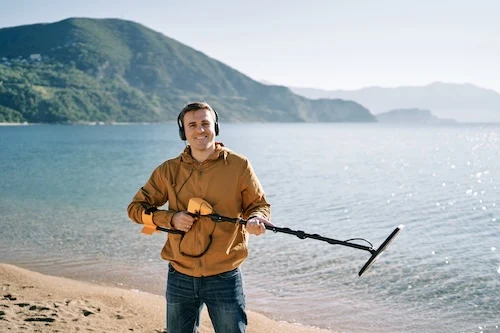
What Makes A Waterproof Metal Detector
A truly waterproof metal detector is designed from the ground up to be fully submersible. This involves more than just a bit of rubber lining.
The control box, which houses all the sensitive electronics, is hermetically sealed using gaskets and O-rings to prevent any water ingress, often tested to a specific pressure or depth (like an IP68 rating). The cables and their connection points are also specially designed with waterproof screw-in connectors.
The speaker is often a sealed 'piezo' type that can withstand water pressure, though most underwater detecting is done with dedicated waterproof headphones. It's this complete system of sealed electronics and specialised connectors that allows you to confidently take your machine into the water.
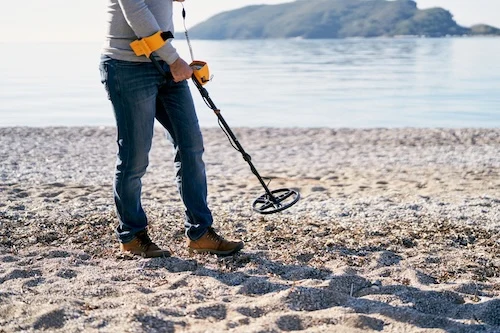
My Top Tips for Metal Detecting In Water
Use the Right Scoop
A handheld trowel is useless in the water. You need a long-handled sand scoop with holes that allow water and sand to drain away, leaving your target in the basket.
A stainless steel or heavy-duty plastic scoop is essential. Trust me, trying to pinpoint and retrieve a target in moving water without one is an exercise in pure frustration.
Check the Tides
Before heading to the beach, always check the tide times. The best time to hunt is on a falling tide, especially after a storm.
Storms churn up the sand and can expose older, deeper layers where heavier items like old coins and gold rings have settled. Hunting the low tide line can be incredibly productive.
Hunt the 'Scour'
Look for areas on the beach where the waves have 'scoured' away the soft sand, leaving behind heavier stones, shingle, and clay beds. These are natural collection points for heavy objects.
If you see a long line of pebbles and shells, that's a great place to focus your efforts as coins and rings will often drop out of the sand in the same place.
Safety First
Never detect alone in the water, especially in remote areas or rough conditions. Let someone know where you are going and when you expect to be back. Consider joining a metal detector club to find a detecting buddy.
Be aware of currents, tides, and underwater obstacles. Wear appropriate footwear like wetsuit boots to protect your feet from sharp objects. No find is worth risking your safety for.
Quick Summary
| Rank | Detector | Amazon Link |
|---|---|---|
| #1 | Minelab Equinox 900 Best Value For Money Waterproof Metal Detector | View On Amazon |
| #2 | Nokta Simplex+ Best Budget Waterproof Metal Detector | View On Amazon |
| #3 | Garrett AT Pro Best Mid-Range Waterproof Metal Detector | View On Amazon |
| #4 | XP Deus II Best High-End Waterproof Metal Detector | View On Amazon |
As an Amazon Associate we earn from qualifying purchases.
Conclusion
Choosing the right waterproof metal detector comes down to your budget and where you plan to hunt. For an entry-level metal detector that punches way above its weight, the Nokta Simplex+ is a fantastic choice.
If you're looking for a proven, reliable workhorse for all-terrain hunting, the Garrett AT Pro will never let you down. For the ultimate in performance and technology, the XP Deus II is in a class of its own.
But for me, the best all-round investment for any UK detectorist is the Minelab Equinox 900. Its multi-frequency technology, lightweight design, and superb performance in our challenging conditions offer the best value for money and will undoubtedly help you find more history. It is my pick for the Best Waterproof Metal Detector overall.
Author Profile

Piotr Lesniewski
"Digging up the past, one signal at a time."
Polish-born, Scotland-based, and obsessed with the beep. My passion began decades ago, exploring fields with my Dziadek (grandfather). Now, with over 10 years of digging under my belt, I'm here to share everything I've learned—unfiltered and unbiased—to help you unearth your own piece of history. No sales pitches, just real field experience.